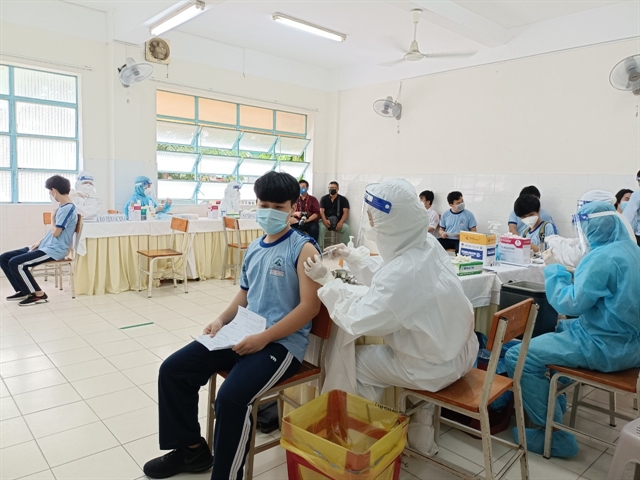 |
|
Students in HCM City's District1 are vaccinated on October 27.
|
According to NIHE vice director, Prof., Dr. Dương Thị Hồng, the institute would provide guidance for medical staff and teachers in the vaccination campaign for students.
This campaign would start first in the localities which were badly hit by the pandemic, and continue in provinces and cities with dense populations and a high risk of the virus spreading, Hồng said.
“First, we will instruct teachers on vaccination for students aged 16 and 17,” she said.
“If the supply of vaccines is sufficient, we will continue to expand vaccinations to children in younger age groups,” she added.
The vaccinations for students will mainly take place in schools, clinics and healthcare centres.
Overweight children and those with underlying medical conditions will have their vaccines at hospitals to ensure safety.
The institute will ask vaccination facilities to pay more attention to monitoring the health of children after vaccination to promptly handle possible reactions.
From November, Việt Nam will kickstart a nationwide campaign to vaccinate children against COVID-19 across the country, starting with older children.
Minister of Health Nguyễn Thanh Long said that the COVID-19 vaccination campaign would be done first for children aged 16 and 17, then gradually given to younger children.
The Ministry of Health has annouced that Pfizer and Moderna COVID-19 vaccine will be used for children, after being recommended by the World Health Organization and used for children in many countries, but current limited supplies means that only Pfizer shots are being offered.
According to Prof. Dr. Trần Minh Điển, director of the Việt Nam National Children’s Hospital, the United Nations and a number of European countries had started giving COVID-19 vaccinations to children aged over 12, including those with underlying medical conditions.
In the US, vaccine coverage for children aged over 12 had reached over 50 per cent, Điển said.
“We have seen the efficacy, safety and immunogenicity in vaccinated people aged over 18,” Điển said.
“In the world today, many countries continue to vaccinate children aged 12-17. For children aged 5-12, some countries also had injection data,” the doctor said.
The doctor also said that according to current data, the number of children infected with COVID-19 was not low, but the rate of serious illness and death was lower than that of the group of adults over 50 years old.
"We need to vaccinate children against COVID-19 to reduce severe symptoms of the disease, especially in the group of children with underlying diseases such as cancer, kidney and liver disease. The vaccine will help to reduce the mortality rate for these children," he said.
Regarding parents’ concerns, Khổng Minh Tuấn, vice director of Hà Nội Centre for Disease Control (CDC), said that vaccinations for children were not a concern because many countries in the world had completed jabs for children aged 12-17, and some countries had injected children aged 5-11.
Tuấn said that it was understandable that some parents were worried about their children's reactions after vaccination.
“Children from 12 years old have developed antibodies similar to adults, so the reaction after injection is almost no different from that of adults,” Tuấn said.
The most important thing was the issue of health screening before vaccination to get the correct indication and ensure safety for children, he said.
According to the CDC vice director, the preparation and implementation of vaccinations for this group would be especially difficult. Vaccination sites would be more crowded because the children’s parents or guardians must accompany them.
Sometimes a child's post-injection reaction was psychological rather than vaccine-related, he said.
At present, Hà Nội’s health sector has listed about 680,000-840,000 children who are eligible for vaccination.
Dr. Ngô Khánh Hoàng, Hà Nội CDC’s vice head of Infectious Disease Department, said: “All vaccines have a certain reaction rate, but the rate is low, so parents could be assured and should not delay vaccination for their children," he added.
HCM City was the first locality selected in Việt Nam to pilot administration of COVID-19 vaccines to students.
On October 27 and 28, 39,756 children in 21 districts and Thủ Đức City were vaccinated.
Source: VNS